
Bedankt voor het vertrouwen het afgelopen jaar! Om jou te bedanken bieden we GRATIS verzending (in België) aan op alles gedurende de hele maand januari.
- Afhalen na 1 uur in een winkel met voorraad
- In januari gratis thuislevering in België
- Ruim aanbod met 7 miljoen producten
Bedankt voor het vertrouwen het afgelopen jaar! Om jou te bedanken bieden we GRATIS verzending (in België) aan op alles gedurende de hele maand januari.
- Afhalen na 1 uur in een winkel met voorraad
- In januari gratis thuislevering in België
- Ruim aanbod met 7 miljoen producten
Zoeken
Australians at Geneva E-BOOK
Internationalist Diplomacy in the Interwar Years
James Cotton
E-book | Engels
€ 24,59
+ 24 punten
Omschrijving
After the dubious justice of the Treaty of Versailles and the turmoil of the interwar years, the League of Nations is mainly remembered as a body that failed to create mechanisms that might have forestalled the horrors of Nazism, fascism and the Second World War. It has understandably been overshadowed by the United Nations, that larger, more globally representative body which grew from the League, and which was founded on more unequivocally noble principles in the aftermath of a clear-cut victory of good over evil. But as the limitations of the United Nations become ever more apparent, we can look with more sympathy at the League and consider what we might learn from the endeavours of those driving this first attempt at global governmental coordination. As James Cotton relates in this illuminating account, a surprising number of Australians lent their talents and enthusiasm to this internationalist project, and Australian interests were prominently represented. Former Prime Minister Stanley Bruce was there, along with numerous other Australian men and women who made important contributions to international deliberations on questions of global organisation and interaction. This deeply researched and carefully realised story will recast understandings of both the League itself and the place within it of prominent interwar Australian internationalists.
Specificaties
Betrokkenen
- Auteur(s):
- Uitgeverij:
Inhoud
- Aantal bladzijden:
- 256
- Taal:
- Engels
Eigenschappen
- Productcode (EAN):
- 9780522879001
- Verschijningsdatum:
- 31/10/2022
- Uitvoering:
- E-book
- Beveiligd met:
- Adobe DRM
- Formaat:
- ePub

Alleen bij Standaard Boekhandel
+ 24 punten op je klantenkaart van Standaard Boekhandel
Beoordelingen
We publiceren alleen reviews die voldoen aan de voorwaarden voor reviews. Bekijk onze voorwaarden voor reviews.









